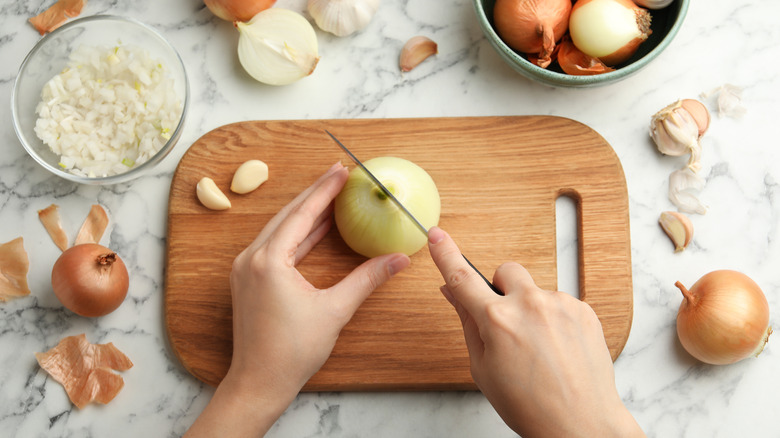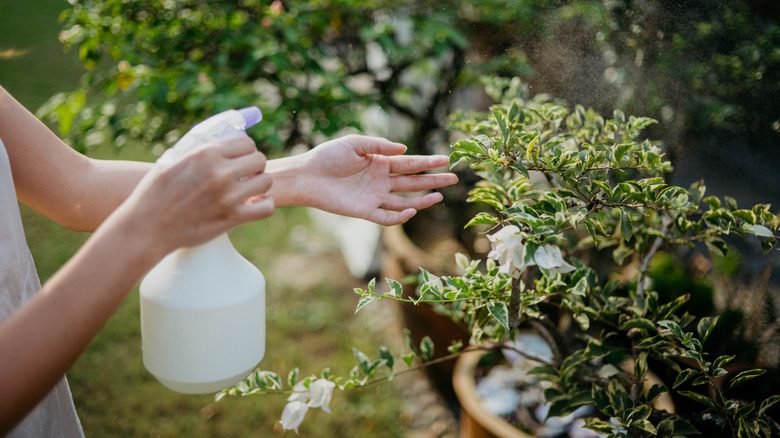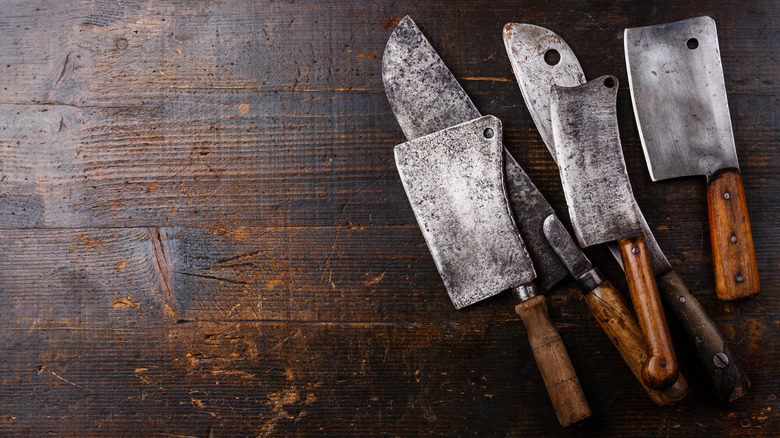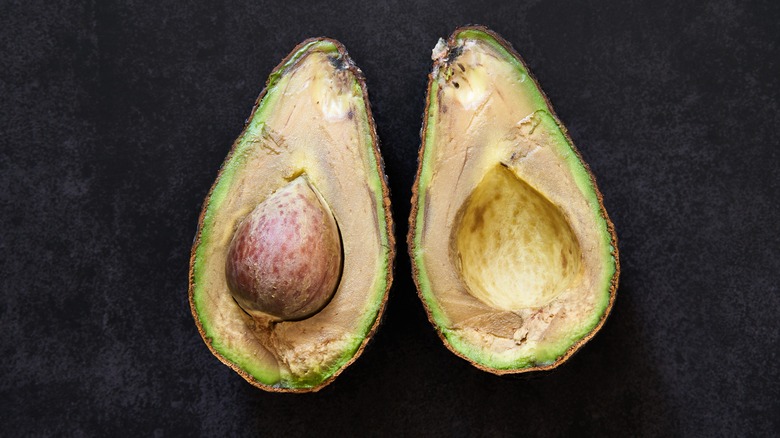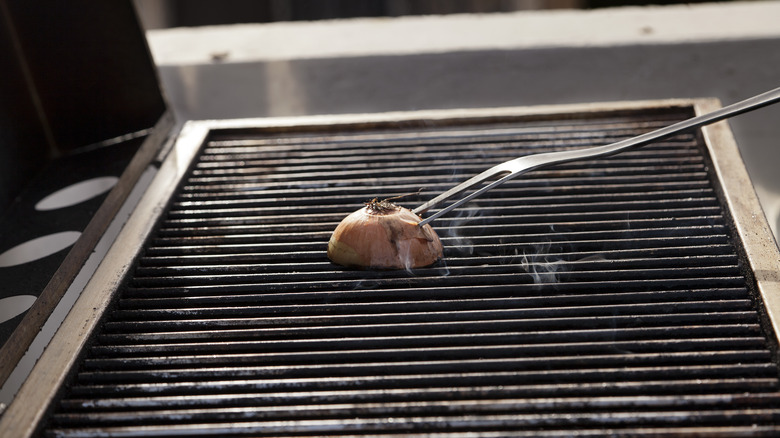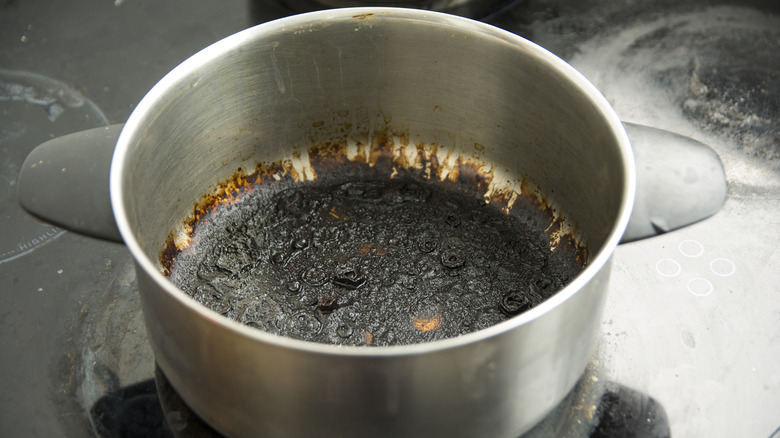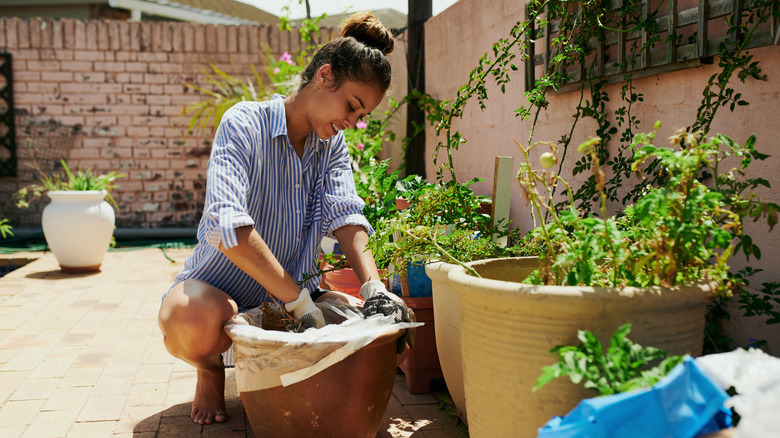Unusual Ways You Should Be Using Onions In And Around Your Home
Onions have long been considered a kitchen essential, adding flavor and depth to countless dishes. But did you know that this humble bulb can be just as versatile outside of the kitchen? Every part of an onion, from its layers to its scraps, can be repurposed in unconventional ways, making it the ideal solution for a variety of household tasks. From combating household odors to helping out in the garden and controlling pests, onions offer a natural and eco-friendly alternative for those looking to minimize waste and reduce their environmental footprint.
Onions boast a unique chemical profile full of sulfur and acids. While these compounds are responsible for the tears associated with chopping onions, they also contribute to the vegetable's rich flavor and cleaning properties. Whether you're in need of a quick fix or simply looking to make the most of what you have, here are eight unusual and unexpected ways to use onions in and around your home.
Eliminate odor
Onions have a notoriously strong smell, so how could they possibly reduce nasty odors in the air? It turns out that the same chemical that makes onions smell (called Syn-propanediol-S-oxide, if you want to get scientific) is very effective at reacting with other scent-producing chemicals and subduing them. People often use the metaphor that an onion's chemical bleach other smells. And don't worry, though your room may smell as soon as you cut the onion, eventually all scents will be neutralized and you will be left with a fresh-smelling home.
If you have a damp basement or kitchen mishap that leaves your nose overwhelmed, grab an onion and cut it into halves or large slices. Leave them around the affected room overnight. In the morning, they should look shriveled, and your room should smell much better. This method is said to be especially useful for getting rid of that fresh paint smell or helping eliminate the smell of burnt rice.
Repel garden insects
A bug infestation in your garden can not only ruin your crops but also your gardening experience, leaving you with itchy bites. If you don't want to resort to using chemical-filled pesticides, try making a DIY insect repellent using onions. Onions and other members of the allium family, like garlic and leeks, contain sulfur. This all-natural deterrent works because the sulfur creates a scent that bugs absolutely hate and will avoid at all costs, all while not harming your plants. Onions are even said to have insecticidal properties that will eliminate existing insect populations, though there hasn't been much research on the subject. Plus, if you are facing a large infestation, there are many other stronger pesticides you can use.
To make a natural insect repellent spray, blend or crush onions and mix them with water. Strain the mixture to obtain a smooth liquid, then pour it into a spray bottle. Spray it all over your garden, anywhere you see bugs. Optionally, you can add a small amount of liquid dish soap to help the spray stick to plants better. Another similar method involves making an onion tea by boiling chopped onions in water for a short time. Let the mixture cool, then strain and use the liquid as a spray for plants.
Sharpen rusty knives
A rusty knife can not only cause rust to flake off and end up in your food, but it also poses a safety concern since they are more likely to be dull and have rough edges, which can make them more difficult to handle and increase the risk of accidents. Onions contain sulfuric acid, which can help break down and dissolve rust on metal surfaces, including knives. Using an onion to clean a rusty knife not only helps maintain the knife's sharpness and safety but also offers an alternative to using harsh chemical cleaners.
If your favorite knife is starting to look less than shiny, grab an onion and cut it in half so you have a flat surface to work with. Sprinkle some salt on the cut onion to make it more abrasive and start scrubbing. Apply moderate pressure as you work the onion into the affected areas. Soon, your knife should look brand new! To prevent rusting in the future, make sure to dry your knife thoroughly after each use and wash, as when water is left on a knife, it can start to break down the metal, leading to rust formation.
Keep avocados fresh
Avocados are delicious, but pricey, and you don't want them to go bad before you can enjoy them. Once you cut into an avocado, it can feel like a race against the clock to finish it, since even within a few hours, it can start turning brown. Luckily, another kitchen staple can come to the rescue. When an onion is cut, the sulfur compounds are released, which can help prevent or slow down oxidation, which is the process that causes avocados to brown.
Simply half an onion and place a piece in a sealed container with the cut side of the avocado. If you store the container in the refrigerator, the avocado should stay green for two to three days. But beware — the avocado will absorb some of the onion's flavor. This is fine if you have plans to make tacos or guacamole, but if you're saving it for a sweet avocado chocolate mousse, you might want to skip this method of preservation.
Clean your grill
Nothing pairs better with a burger than some grilled onions, but if your grill is in bad shape, it is worth it to sacrifice half an onion to get it sparkling again. The greasy grime and carbon buildup on your grill may require a lot of effort to scrub off, and traditional grill cleaners often have toxic chemicals and an unpleasant smell. An onion provides a natural and inexpensive alternative for reviving your grill. The onion's acidity will dissolve this tough residue without the need for extensive scrubbing. Plus, using an onion to clean your grill is an eco-friendly approach that eliminates the use of harsh chemicals.
First, turn your grill as hot as it can go for about 10 minutes to burn off as much gunk and debris as you can. Then take half an onion and skewer it with tongs so it is easily maneuverable without putting your hands close to the heat. Scrub the onion against the grill grates so that the acidity can work its magic. Depending on the level of grime on the grill grates, you may need to use multiple onions to thoroughly clean the surface. Just cut a fresh onion in half and continue rubbing the grates. After cleaning, let the grill cool slightly and cook as usual. Happy grilling!
Dye Easter eggs
With Easter approaching, this is the perfect activity for those who want to be festive without the hassle of dealing with messy egg dyeing kits. This method is practically free and all-natural, making it ideal for households with young kids. For this trick, you only need onion skins. Whether you use red or white onions, or a combination of both, you can create a rich orange color that evokes the spirit of spring.
Add your onion skins to a big pot with water and bring to a boil, adding in 2 teaspoons of white vinegar, which will make the color more vibrant. Gently add your eggs to the water and boil for 8 to 10 minutes, depending on your preference. With this method, you cook the eggs directly in the dye, saving you time and energy. However, if you want to add some extra springtime cheer to your eggs, Ciao Florentina suggests using flowers and greenery to create a design.
To do so, gather your favorite small flowers and plants, then cut up an old stocking into 3 to 4 inch sections. Place the flowers face down on your eggs and use the stocking to hold it in place, knotting the fabric at the end. Boil your eggs in the dye. Once the eggs are cooled down, carefully unwrap them and remove the flowers to reveal your beautiful design.
Fix a burnt pan
We've all been there, you get distracted and leave a pot on the stove for too long, then suddenly you have a burnt layer at the bottom that won't come off no matter how hard you scrub. The pan isn't ruined, you just need some extra help from the acidity in onions and onion skins to help break down that burnt residue, allowing it to float right off. You'll want to make sure that you get all the burnt bits off so they don't make their way into your next meal, since a study by the Swedish National Food Administration and the University of Stockholm showed that burning food creates a substance called acrylamide that is potentially harmful to humans if consumed in high enough doses (via Journal of Health Communication).
Start by chopping up some onions, and save the skins since you can boil those as well. Fill the burnt pan with water and place the onion in it, bringing it to a boil. Let it boil for about 15 to 20 minutes and then let it cool down slightly. Next, using a wooden spoon or a spatula, scrape the bottom of the pan gently. The burnt residue should come off more easily now, with some pieces even floating to the top. After the burnt residue is removed, wash the pan with dish soap as you normally would, and your pan should be as good as new.
Fertilize plants
We all want our gardens to be as healthy and beautiful as possible, but plant health will quickly decline if they aren't getting the proper nutrients from the soil alone. Routinely fertilizing your plants is a quick way to give your garden the boost it needs, but store-bought products are expensive and often contain chemicals that are toxic to any pets running around your yard that might ingest some. Instead, you can use onion skins, which are a rich source of several nutrients that are beneficial for plants, including nitrogen, phosphorus, and potassium. Unlike synthetic fertilizers, which can release nutrients quickly and in high concentrations, organic materials like onion skins break down slowly and release nutrients gradually over time. This natural, slow-release mechanism can help prevent nutrient leaching and runoff.
As you peel onions for cooking, save the skins. Once you have gathered enough, spread them in a single layer on a flat surface and allow them to dry in a well-ventilated area. This helps to prevent mold and rot. Once the skins are dried, you can crush them into smaller pieces or shred them using a blender. This step helps to break down the skins more quickly in the soil. Sprinkle the peels around the soil of your garden. Alternatively, you can make a liquid onion peel fertilizer by allowing the peels to soak in water for 24 hours, straining, and using this liquid to water your plants.
